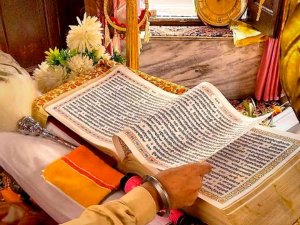The historical significance of the titles 'Singh' and 'Kaur' in Sikhism is deeply rooted in the transformative events that transpired on Baisakhi day, March 30, 1699, when Guru Gobind Singh Sahib initiated the Khalsa Panth and introduced the ceremony of 'Khande di Pahul' (baptism by the double-edged sword). This pivotal moment marked the emergence of a distinct identity for Sikh males, who embraced the title 'Singh' as a symbol of their commitment to the Khalsa's principles.
The five individuals who first adopted the title 'Singh' were Daya Ram, Dharam Das, Mohakam Chand, Himmat Rai, and Sahib Chand. Guru Gobind Singh Sahib also assumed the name Guru Gobind Singh from that point onward. The adoption of the title 'Singh' became a ritualistic act after undergoing 'Khande Di Pahul,' reinforcing the sense of belonging to the casteless 'Khalsa' community.
The term 'Singh' itself, derived from Sanskrit meaning 'lion,' is not merely a suffix but an integral part of every Sikh male's name, reflecting a shared identity and commitment to Sikh history. The significance of 'Singh' goes beyond being a personal identifier; it embodies the virtues of courage, bravery, and national cohesion among Sikhs.
Even in historical accounts by Qazi Noor Muhammad during Ahmad Shah Durrani's invasion, derogatory language was used towards Sikhs, yet he consistently praised the Sikhs as 'lions' ('singh'). This illustrates the enduring impact of the title on the perception of Sikhs, emphasizing qualities of courage and bravery.
Legally, the titles 'Singh' and 'Kaur' carry weight under the Sikh Gurdwara Acts, distinguishing Amritdhari Sikhs/Singhs as eligible participants in the Sikh Gurdwara Management Committee elections. The 'Sikh Rehat Maryada' further outlines the importance of 'Shaksi Rahani' and 'Panthak Rahani,' emphasizing personal and national guidance for Sikhs.
In parallel, Guru Gobind Singh Sahib bestowed the title 'Kaur' upon Sikh females, symbolizing equality, bravery, and responsibility. Just as 'Singh' signifies a male prince, 'Kaur' represents a Sikh girl as a brave and responsible individual, reinforcing gender equality in Sikhism.
As Sikhs face challenges globally, the act of including 'Singh' and 'Kaur' in their names becomes a powerful demonstration of national unity and commitment to Sikh values. Embracing these titles is not only a personal choice but also a collective assertion of Sikh identity, contributing to the preservation of their rich heritage in the face of external pressures.





